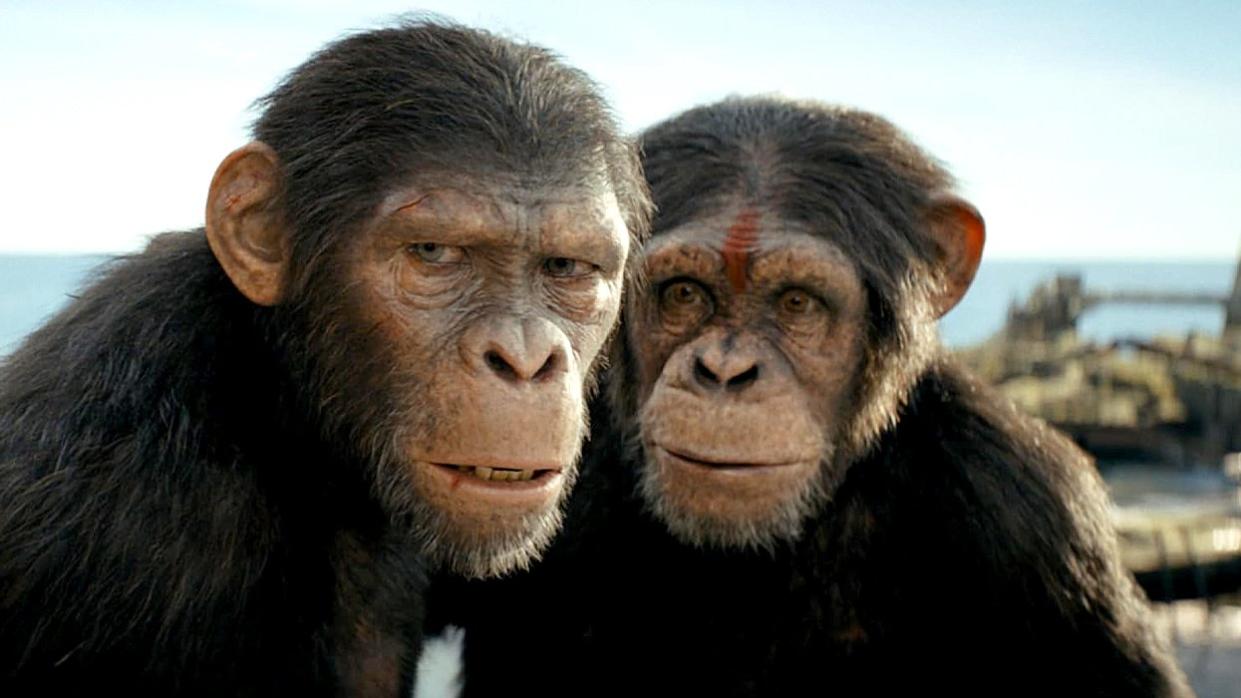'Kingdom of the Planet of the Apes' is a worthy successor to Caesar—but how gay is it?

Welcome to How Gay Is It? Out’s review series where, using our state-of-the-art Eggplant Rating System, we determine just how queer some of pop culture's buzziest films and TV shows are! (Editor’s note: this review contains mild spoilers for Kingdom of the Planet of the Apes.)
Ape movies are back and better than ever!
Kingdom of the Planet of the Apes is the strongest entry in the modern franchise, and a worthy successor to the recent reign of Caesar.
I've been a huge fan of the Planet of the Apes movies since I was little, and love every single one of them (except for the deeply unpleasant 2001 Tim Burton film), and Kingdom of the Planet of the Apes is my favorite installment since 1972's Conquest of the Planet of the Apes.
Kingdom picks up "many generations" after the death of the ape Caesar (played by Andy Serkis in the last three films of the modern franchise) and the establishment of apes as the dominant species on the planet.
Thanks to a virus, humans have devolved and lost the ability to speak and have complex thoughts, and the apes rarely see them any more, especially in large numbers.
The apes are living peacefully, forming their own villages and cultures, when an ape army on horseback comes riding across the lands, pillaging clans, murdering apes, and kidnapping others in order to form a vast network of slaves.
It's through this army that we're introduced to the egomaniacal Proximus Caesar, a self-proclaimed King of the Apes. Proximus Caesar has found an old human vault on the shore and is using his slave army to attempt to open it and get access to the weapons and technology inside.
The film follows Noa, a chimpanzee trying to find his clan that was kidnapped by this new Caesar. On his way, he meets Raka, a wise and compassionate orangutan who is keeping the teachings of Caesar alive, and Mae, a human with a surprising ability.
Together, the three try to stop Proximus Caesar, rescue the apes that he has kidnapped, and make sure the world of apes doesn't go the way of the world of man.
Proximus Caesar is such a great villain, both imposing and a bit idiotic, he gives the film a dose of villainous charisma that some of the other modern installments were missing.
Noa is a great successor to Caesar, who left such a legacy he was hard to follow. But Kingdom succeeds in introducing a new generation of apes that we love and root for just as much as Caesar, Maurice, and the rest.
It also knows that two human characters is just about as many as an Apes movie should have. We come to the theater for the apes, and Kingdom gives us the apes!
But the age-old question we ask here at Out still arises: How gay is it? Honestly, gayer than I thought it would be! Raka is an important character and has quickly become a fan favorite. Not only is he the keeper of Caesar's teachings and the kind heart of the film, but he's also gay.
When Noa and Raka meet, Noa says that the army had destroyed his village. "He was my village," Raka says, nodding his head towards a funeral pyre. When he said that line, my girlfriend and I turned to each other, immediately recognizing this orangutan's beautiful expression of love for his partner.
For that, the film gets a girthy two out of five eggplants!

Kingdom of the Planet of the Apes is now playing in theaters.

